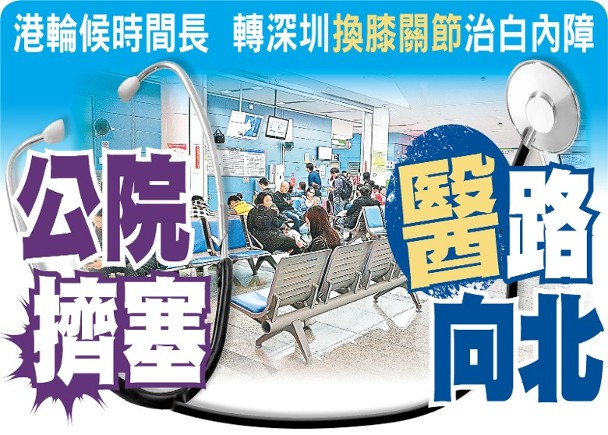
Keyword search
【 Oriental Daily 】 Congestion in public hospital medical road heading north

In recent years, it has become a trend for Hong Kong people to go north, not only for food, entertainment, and shopping, but also for seeking medical treatment. A Hong Kong funded group has established a private hospital in Shenzhen and has been operating for about 3 years. Last month, the hospital recorded a threefold increase in the number of Hong Kong patients seeking treatment compared to the previous year. Many patients undergo surgeries at the hospital, including cataract and knee replacement surgeries, which have long waiting times in public hospitals in Hong Kong. The demand for these procedures has also increased sixfold compared to the previous year. Under the medical voucher scheme, 5000 local patients have been served. Referring to some projects of the hospital, there is indeed a significant difference in fees compared to private hospitals in Hong Kong. The biggest difference is in the treatment of targeted drugs for cancer diagnosis, with fees in Hong Kong being five times higher than those in mainland China. General physical examination items also differ by more than times. Some patient organizations have pointed out that in recent years, there has been a trend of citizens seeking medical treatment in the north. They remind Hong Kong people to choose mainland medical institutions with effective plans such as the Hong Kong government's medical voucher and medical health package to strengthen personal protection when going north.
The long waiting time for public healthcare in Hong Kong and the high fees charged by private healthcare have led many Hong Kong residents to seek medical treatment in mainland China. The Hong Kong company New Wind Tianyu operates a comprehensive hospital in mainland China. The company's executive director and Chief Operating Officer of the Greater Bay Area, Xiao Yihuang, pointed out that its Shenzhen New Wind United Family Hospital officially started operation in May 2022, and as of this year, the number of visits to Hong Kong has reached 17000. Among them, the outpatient volume of Hong Kong people increased threefold year-on-year last month, and nearly 30% of the hospital's revenue comes from Hong Kong people. Among them, 80% of the oncology patients are Hong Kong people. In addition, the number of scheduled surgeries in hospitals last year increased by nearly six times compared to the previous year, including prostate, cataract, knee replacement surgery, etc.
He admitted that initially, the hospital did not expect such a warm response from Hong Kong people, but in the new situation, on the one hand, it needs to strengthen the recruitment of Cantonese speaking personnel to serve Hong Kong people. At the same time, the hospital also employs about 30 Hong Kong doctors, accounting for nearly 30% of the total number of doctors.
The hospital participated in the "Elderly Health Voucher Greater Bay Area Pilot Scheme" launched by the Hong Kong government in August last year. Xiao pointed out that under the plan, the hospital has recorded nearly 5000 visits from Hong Kong elderly people so far, of which 20% are for physical examinations and 21% are for oral services. At the same time, many people also use local specialized examination services such as ophthalmic examinations and surgical examinations.
The main reason for consumption in the north is "cost-effectiveness", and the same goes for medical services in the north. Xiao Yihuang cited knee replacement surgery as an example and pointed out that in public hospitals in Hong Kong, the average waiting time for the surgery is as long as two to four years, while in private hospitals, the average cost of the surgery is nearly HKD 142000. However, the package fee for a single knee at Xiao's Shenzhen hospital is RMB 42000, which is about HKD 46000, and the surgery can be arranged within a week at the earliest. The surgeon can also choose. Xiao emphasized that the goal of the hospital is not to "compete for rice bowls" with private hospitals in Hong Kong, but to provide medical services to more patients who are delayed in seeking treatment due to price issues.
Hong Kong is currently studying the implementation of a transparency system for private hospital fees. Xiao pointed out that similar measures have been set up in mainland China, and the hospital's services also have a "package fee" system, which does not charge additional fees for materials such as "every piece of cotton". An electronic price list is also available at the entrance for patients to refer to. In addition, the hospital has also collaborated with multiple Hong Kong insurance companies to include its services in the current medical insurance plan coverage.
Lin Zhimei, the chairman of the Hong Kong Patient Policy Alliance, stated that his friends and other patient organizations have also reported a trend of seeking medical treatment in the north in recent years. Due to the lower prices and rent of imported drugs in mainland China, there is a certain price gap in medical services between the two places, which may be one of the reasons that attract citizens to seek medical treatment in mainland China. Regarding service quality, he emphasized that the medical level in mainland China may not necessarily be lower than that in Hong Kong. There are also many "reincarnated Hua Tuo" and experts in mainland China, but the country is large and there are also many doctors. The medical level "depends on finding a local doctor". He suggested that if Hong Kong people plan to seek medical treatment in mainland China, it is best to find large medical institutions with certain certifications to avoid accidents.
Peng Hongchang, a member of the community organization association that focuses on patient rights, also pointed out that since the outbreak of the epidemic, the trend of seeking medical treatment in the north has become increasingly apparent, in addition to eating, drinking, and having fun. One of the main reasons is the cost-effectiveness of medical services. With the increase in the number of people seeking medical treatment in the north, he is concerned that medical accidents may also increase. He reminds citizens that the Hong Kong government currently has a certain degree of supervision over institutions participating in the Greater Bay Area medical voucher and health promotion programs, so citizens can also choose relevant institutions. At the same time, he hopes that the government will strengthen its supervision of recognized medical institutions and consider educating citizens on how to choose suitable and guaranteed mainland medical institutions.
彭鴻昌又提到,香港牙科服務收費較貴,動輒可能要花費過萬元,而內地僅需數千元,吸引市民「貪平」,甚至未有考慮自己有否需要就北上內地睇牙。他指出,香港牙醫主張幫病人盡量保留真牙,但是內地似乎不同,甚至有部分牙科機構會建議病人「一次剝幾隻會平啲」。彭鴻昌提醒市民要小心選擇醫療服務。
Original website: Oriental Daily A1: The public hospital is congested and the medical road is heading north| on.cc Dongwang | China, Hong Kong, Taiwanhttps://hk.on.cc/hk/bkn/cnt/news/20250612/bkn-20250612033009668-0612_00822_001.html










